A license plate lookup is a valuable tool for accessing information about a vehicle and its owner using the license plate number. For example, as of 2023, there are 792,826 vehicles registered in Alaska. Law enforcement officers, potential buyers, insurers, and even curious citizens may rely on a license lookup to access data associated with any of these vehicles.
In Alaska, license plate lookups are often conducted using official government databases or approved third-party services with access to public records. The Alaska Division of Motor Vehicles (DMV) maintains a comprehensive database of vehicle records, including a vehicle's history, registration particulars, and owner verification data.
Alaska has stringent privacy laws to protect personal information. However, certain non-sensitive vehicle details remain accessible through authorized lookup services. These services allow individuals to obtain specific information about a vehicle while adhering to the state's privacy regulations.
Why Run a License Plate Search in Alaska?
A license plate lookup in Alaska serves various purposes. Here are some reasons for searching:
- Verify Vehicle History: Uncover accident history and salvage records, helping buyers avoid vehicles with hidden issues.
- Check Ownership and Title Information: Make sure the seller is the rightful owner, and the title is clear of liens or disputes.
- Confirm Registration Status: Reveal if the vehicle's registration is current or expired, aiding compliance with state laws.
- Check for Stolen Vehicle Status: Identify if a vehicle has been reported stolen, preventing complications for buyers and law enforcement.
- Aid Law Enforcement and Insurance Processes: Assist in investigations and streamline insurance claims by providing accurate vehicle data.
- Discover Unpaid Fines: Reveal any unpaid parking tickets or fines associated with the vehicle.
- Evaluate Vehicle Use History: Determine if the vehicle was used commercially or as part of a rental fleet, indicating potential wear and tear.
Is it Legal to Perform a License Plate Lookup in Alaska?
In Alaska, license plate lookups are legal but subject to specific regulations. The Alaska Public Records Act (APRA) governs access to vehicle information in the state. While this act allows public access to non-confidential information, vehicle-related searches must serve legitimate purposes. Here are some common legal uses:
- Vehicle verification
- Accident investigations
- Pre-purchase checks
- Criminal investigations
- Insurance claims
Alaska law restricts access to sensitive personal information. Only authorized personnel can access detailed owner data. The public can obtain limited vehicle-related information through the DMV or approved third-party platforms.
Keep in mind that misuse of license plate information results in civil or criminal penalties under Alaska's privacy statute. The DMV can deny access to records if misuse is suspected as per privacy regulations.
How Can You Conduct a Alaska License Plate Lookup?
The Alaska DMV does not offer a dedicated system for public license plate searches. Individuals seeking to look up license plate information can use any of the authorized National Motor Vehicle Title Information System (NMVTIS) data providers.
NMVTIS is a federal database that contains information about a vehicle's title, odometer readings, and damage history. Several approved providers, such as GoodCar.com, InfoTracer.com, Recordsfinder.com, and StateRecords.org, allow users to access this information by using a vehicle's license plate number.
To obtain a detailed report, interested parties can visit the websites of these NMVTIS-approved providers. Then, they need to select “Alaska” as the state and enter the specific license plate number in the right sequence in the space provided. There is a fee for each search done. The individual can then receive the results with information on the vehicle's condition and history.
There are also alternative methods available to get vehicle information other than license plate lookup. To learn more, check the “Frequently Asked Questions” of this guide.
What Information Can You Obtain from a Alaska License Plate Lookup?
The extent of data available in a license lookup in Alaska varies between basic lookups and comprehensive reports.
Basic License Plate Lookup Data
- Make, model, and year of manufacture
- Vehicle type and drive type
- Transmission and engine specifications
- Color and original manufacturer’s suggested retail price
Comprehensive Reports and Additional Data
More detailed reports, often from the DMV or NMVTIS data providers, provide deeper insights into a vehicle's history:
- Title records and ownership history, including any liens
- Title brands indicating salvage, rebuilt status, or flood damage
- Major accident reports and safety issues
- Manufacturer recalls and safety warnings
- Odometer readings and potential tampering alerts
- Service and maintenance records
What Does an Alaska License Plate Look Like?
Before conducting a license plate lookup, confirm that the plate is indeed from Alaska. Alaska plates typically feature unique elements and slogans like "The Last Frontier," which distinguish them from plates from other states.
Current Alaska Plate Designs
The Alaska DMV offers a variety of license plate designs that reflect the state's culture, natural beauty, and support for various causes. Here are some of the current designs (images are from the Alaska DMV):
Standard Gold Design
This design applies to all standard license plates issued to Alaska residents.
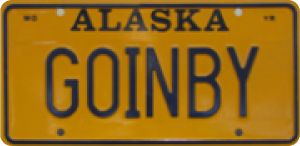
Special Edition Design
Alaska offers two special edition designs, The Last Frontier and the Grizzly Bear.
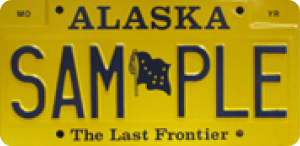
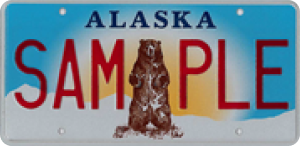
Cause-Specific Designs
Various designs support causes such as the Blood Bank of Alaska and Choose Life.
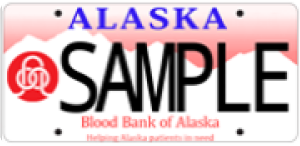
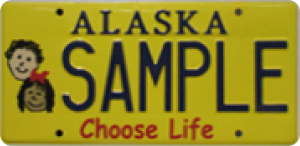
Personalized or Vanity Designs
The current designs for personalized license plates are the Mountain, Caribou, and In God We Trust.
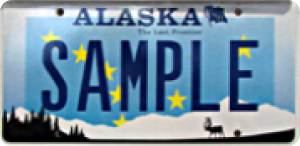
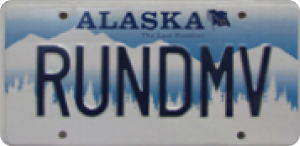
Disability Plate Designs
These are designs for license plates intended for people with disabilities.
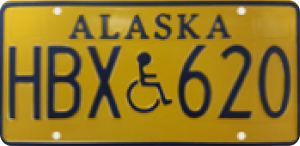
Military-Specific Designs
These designs showcase the specific military organization the driver is affiliated with, such as the Alaska National Guard design.
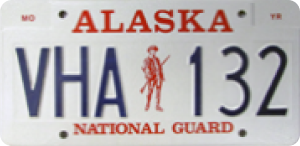
Recent License Plate Design
The Alaska DMV offers a variety of license plate designs that reflect the state's culture, natural beauty, and support for various causes. Here are some of the current designs (images are from the Alaska DMV):
The most recent plate design is the fireweed. This design was introduced on August 19, 2024, and features a vibrant fireweed flower. It symbolizes creativity and local beauty. It replaced older art plates and supports the arts. The fireweed design applies to personalized license plates.
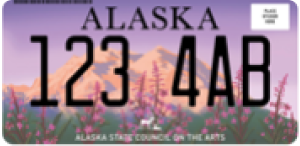
For more information on the different license plate designs, check the “License Plate” page of the AK DMV website.

License Plate Types in Alaska
The type of license plate issued to a vehicle in Alaska plays an important role in the lookup process. Some plate types may contain additional privacy protections or specific registration information that affects the data available through searches.
Here are the major license plate types issued by the Alaska DMV:
- Standard License Plates: These plates are available to all vehicle owners and are typically assigned to private passenger vehicles, trucks, and motorcycles.
- Personalized Plates: These plates share the same design as the standard plate but have unique alphanumeric combinations chosen by the applicant.
- Military and Veteran Plates: These plates include specific symbols such as military units, branches, or awards and require proof of military service or veteran status.
- Disability Plates and Placards: These plates and placards include symbols indicating parking privileges for individuals with disabilities.
- Specialty Cause Plates: These plates support specific organizations or causes. A portion of the fees from these plates benefits specific organizations.
- Commercial Plates: These plates include basic identifying features and are issued to commercial vehicles operating in Alaska.
- Temporary Plates: These paper plates are issued to newly purchased vehicles awaiting DMV processing and are valid for a limited time, typically 30 days.
Frequently Asked Questions (FAQs)
Here are additional details related to license plate lookup in Alaska:
- Can I Look Up AK License Plates for Free?
The Alaska DMV offers free access to limited public vehicle information through its online services or in-person requests. The free version can include accident history and ownership records. However, because of privacy laws, these free lookups typically exclude personal details.
- Do All Alaska License Plate Lookups Work for Custom or Personalized Plates?
A license plate lookup works on both standard and custom or personalized plates. However, due to the unique designs and text of personalized plates, there may be restrictions on accessible information. For clarification, contact or visit any Alaska DMV office or the designated provider.
- How Long Does a Typical Alaska License Plate Lookup Take?
A typical online lookup for license plates in Alaska can give results instantly or may take only a few minutes. If the request is made in person, it can be done on the same day. However, if the request is made by mail, it can take a few days to weeks.
- Can I Perform Bulk License Plate Lookups in Alaska?
The Alaska DMV does not offer bulk lookup services to the public. However, certain commercial services allow businesses and law enforcement agencies to perform bulk searches. These bulk lookups typically require special permissions, such as being a licensed investigator or law enforcement officer.
- Are There Any Alternatives to a License Plate Lookup for Obtaining Vehicle Information in Alaska?
In Alaska, individuals can obtain vehicle information through alternative methods besides a license plate lookup. One option is to submit a request using the Alaska DMV's Driving Record Request platform. Alternatively, they can visit any DMV office to complete the Driving Record Request (Form 419F) in person or mail the form to the address provided on it. Additionally, information can be obtained by using a VIN check through any approved NMVTIS data provider.
